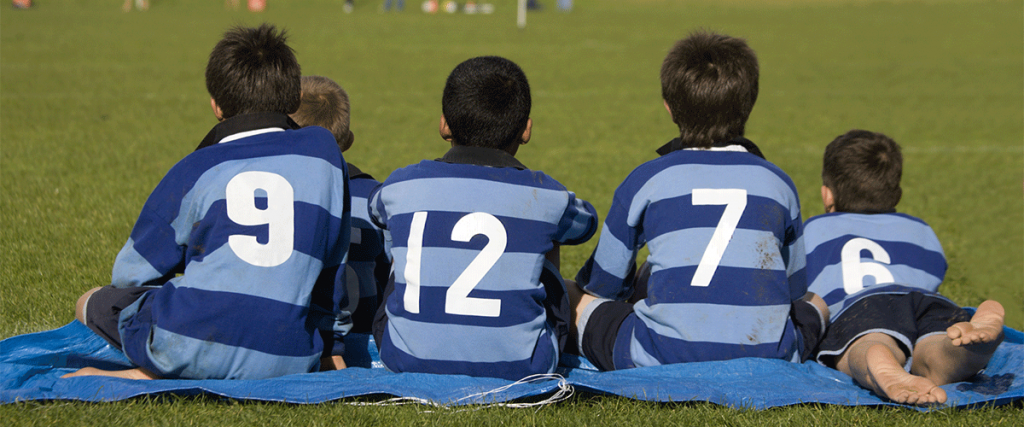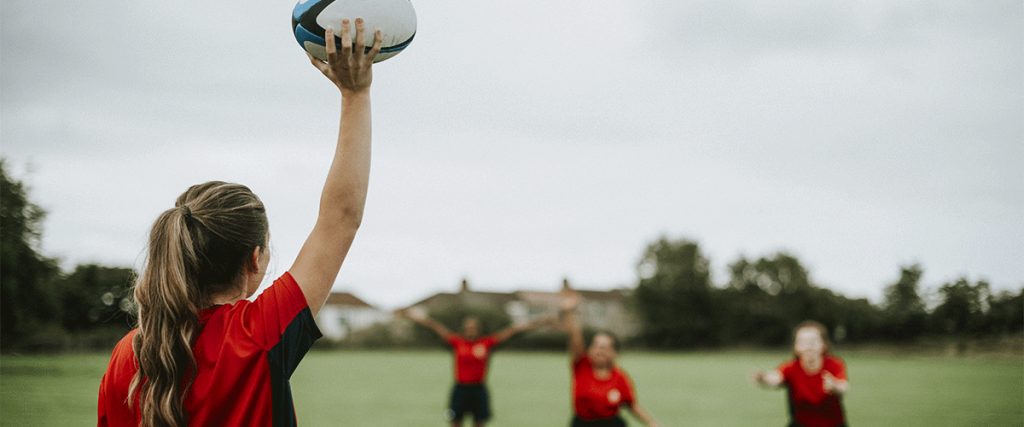Tips when coaching junior rugby players

What is junior rugby?
In most countries, kids start playing junior rugby at club or school from 5 years of age. They normally start out their rugby pathway by playing the non contact forms of the game, such as rippa rugby. Then after a couple of years playing non contact rugby, children start playing 10 aside tackle rugby, using half a field, then progress to playing 12 or 15 aside rugby on a full field when they become teenagers.
In most rugby playing countries, girls and boys play together until they move to college, around the age of 13. At that point the girls and boys tend to split into separate male and female rugby grades.
As such, most of the content of this page relates to junior rugby players, male and female, between the age of 5 and 13. However, much of what we propose is also applicable to coaching teenagers.
Junior Club Rugby Tours
A great way to get your junior club, school or college rugby team to bond, is to arrange a rugby tour. This could be a junior club or college rugby tour to New Zealand, Australia or even a local tour to one of your neighbouring provinces or villages.
Remember, the purpose of your tour is to ultimately build a positive team culture, rather than to focus too much on winning every game.
For the most part, rugby tours are the most fun and memorable experiences a child can have.
Why coach a junior rugby team?
Unfortunately, most junior rugby is coached for the following misdirected reasons.
- The coach wants to ensure players from friends or family get special treatment within the team. For example, they get to play a particular position, get leadership roles or influence team awards. Unfortunately, this is by far the most common motivation for coaching junior rugby and why kids drop out of the game.
- The coach wants to relive his or her rugby experiences through the kids, treating the team like a pro adult team.
- The coach wants to create a highly competitive winning team, by following a winning is grinning ethos at all costs.
The best kids rugby coaches we have worked with are selfless and fair. They are motivated by creating fun and engaging environments that foster skills development, teamwork and sportsmanship. They don’t focus on winning, nepotism or their ego.
These coaches tend to create child and not adult centric environments.
What motivates a child to play rugby?

A 2019 qualitative study with eight focus groups using 30 children aged 6–11 years from Auckland, New Zealand, found “the dominance of sport as competition would appear to serve the needs of coaches and parents more than those of children”.
The top 5 motivators for playing rugby were discovered to be:
- Getting compliments from coaches.
- Playing well during a game.
- End of season team parties.
- Practising with specialty trainers / coaches.
- Exercising and being active.
‘Winning’ scored only 30th on this list.
Coaching kids rugby is important
Coaching a kids rugby team is arguably the most important level of rugby to coach for two related reasons:
- A great experience may bond them to the game for life.
- A poor experience may lose them to the game, and all team sports, forever.
Tip #1. Learn how to coach junior rugby
You may be an ex-player or someone that knows the game well.
However, knowing what to coach is the easy part. For example, let’s say you notice the kids bunching on the rugby field and you want to teach them to space out across the field. Creating a learning environment that motivates the kids to learn then improve on the field is the more challenging, yet rewarding, part.
If you’re interested in coaching your child’s team, we recommend you first attend a few recognised junior rugby coaching courses.
Also find yourself a set of junior rugby mentors, ideally one that is values driven, one that is competitive and one that is more about the fun and social aspects of coaching. As you will most probably end up having to coach and meet the needs of all three types of players (and parents).
Then use your mentors to help guide you through your first few seasons – a good set of mentors will save you a lot of time and effort whilst helping you provide a better experience for your players, parent and yourself.
Tip #2. Keep it simple
The first junior rugby practice I coached, we planned to get through 14 drills covering the core principles of play. We ended up getting through only three. Here’s what I learnt since then:
- Plan your sessions around no more than two core skill areas e.g. front on tackle, accuracy with catch and pass. Keep the drills engaging, fun and short (see play-coach-play section below).
- Less talk, more action. Get someone to monitor how much downtime Vs active time you have in your practice sessions. Ultimately, you want +70% to be active time, especially when the colder winter months set in. By active time we mean players moving, doing things, not standing still listening to you.
- Start with the absolute fundamentals (e.g. tackling on the knees) then evolve from there. But be prepared to revisit core skill areas. Have a skills development plan that you want to progress throughout the season, though don’t rush it, be prepared to re-coach core skills but don’t let your sessions become boring and repetitive. Finally, try and stick to your season coaching plan, whether you are winning or losing. Focus on skills development and player engagement, not results.
- Have a co-coach or parent focus on the development players in your squad, while you coach the more advanced players, or do it the other way around. That way the better players don’t get bored whilst the development players don’t feel out of their depth. But do use common terminology when coaching, our your players and parents will get confused.
- Get creative, find ways to coach skills that are fun and engaging for juniors (see next section). We are entering into a new era of coaching with junior players demanding a different style, so take a few risks, laugh if it doesn’t work out, show the kids it’s ok to make mistakes and try new things.
Tip #3. Play-coach-play

Ten years ago, we would arrive with a bag of balls and a set of cones. We’d run a few set drills then have a team run or a bit of a game together. Attendance at practice was high and players coped with repetitive drills.
However, kids now have completely different demands. They live in a world of on demand entertainment and are empowered with a lot more choice.
Gone are the days of running boring drills and expecting your players to attend trainings.
Parents are busy and kids now play a variety of sports that rugby essentially competes against.
That’s the world we live in. The sooner you accept it, the better it will go for you and your players.
For starters, consider using the following play-coach-play method to drive player engagement and skills development. Here’s how it works.
Let’s use the following scenario, where you want to coach the kids how to pass the ball.
Play
Let’s say you want to develop your players catch and pass skills. Set up a fun game of turbo touch, where you just let the game flow for say 10 minutes.
Coach
Get the players together, ask them how the game is going and what they think they are doing well an could do better. Seed into your conversation with them a few catch and pass skill tips, such as better communication and passing at targets. Then run a 15 minute catch and pass session where you emphasise these coaching points.
Play
End up with a final 10 minute turbo touch session. Discuss the same catch and pass coaching points before and after the final game. Ask the players at the end of the session what they learnt and if they felt they improved.
The chances are the play-coach-play approach you just used provided them with a far richer learning experience than had you just thrown down a few cones and asked them to run repetitive catch and pass drills.
Tip #4. Managing parents
Parents will get in your ear a bit. Accept that as part of your coaching experience.
The most common issues parents, and sometimes players, raise are:
- their child wanting more game time
- players wanting to play in another position (maybe one their dad used to play)
- coaches being too competitive or too cruisy
- favouritism and nepotism
- bullying or being picked on
The best way to manage the parent-child-coach relationship is to set a team charter at the start of the season. Create it with the help of your mentors, the club or school and your parents and players.
The team charter should include elements such as:
- your goals for the season (not results oriented, focus on skills)
- your values e.g. fun, sportsmanship, team work, communication
- what you, the players and parents commit to each other e.g. you commit to coaching practices, the parents commit to getting their child to practice and the child commits to being attentive
Once finalised and agreed by all, use the team charter as a living reference throughout the season. But be sure to follow what you state in the charter or it becomes meaningless – united you stand, divided you fall.
Finally, be sure to select a team of coaches and a manager that is fair, wants to develop a child centric environment and is willing to live the values of our team charter.
Tip #5. Favouritism
The values of your team, in particular your team charter, will get seriously undermined if you or someone in your coaching team is perceived as favouring a player or a group of players over another.
We most often observe the following two styles from coaches that either coach or manage their own child as part of a junior team:
- The coach favours their own child.
- The coach is harder on their own child.
Neither approach works well.
Favouring your own child fosters a pattern of unfairness that will rip through the team and before you know it, all the parents are getting in your ear. Favouring also includes providing perks to kids that are better players, such as giving them more game time even if they do not come to practice.
Favouritism is simply damaging for the long term development of a child and the team.
On the other hand, being tougher on your own child is also not fair. Kids are smart, they pick these things up. What you don’t want is your own child telling you he or she wants to quit because you are singling them out.
Ultimately, when coaching your child try and wear a coaches, not a dad or mom hat. Coach them as you would any child, try not to get emotionally involved.
This includes giving him or her just as much praise as you’d give to any other player.
